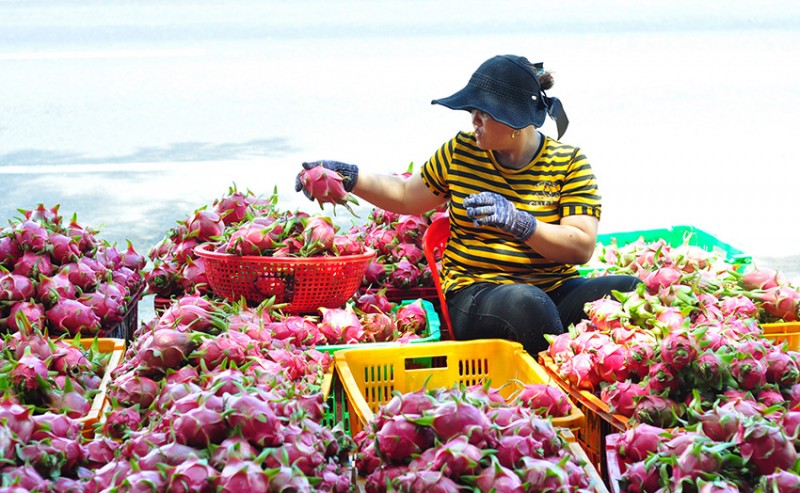Agricultures, Foods, News & Event
With The EVFTA Agreement, why is it still difficult to export agricultural products to the EU?
After 2 years of entry into force, the EVFTA Agreement has had a positive impact on Vietnam’s agricultural exports to the EU market. The total export turnover of this product of Vietnam to the market of 27 EU countries in 2021 will reach 2.6 billion USD, accounting for 12% of the proportion of Vietnam’s agricultural exports to the world market.
However, if we consider each group of products according to the HS code separately, it can be seen that the position of export value of Vietnamese agricultural products in the EU market is still quite small. Specifically, cocoa and cocoa products – HS 18 ranked 65th; edible vegetables and some roots and tubers – HS 07 ranked 59th; preparations from vegetables, fruits, nuts or other parts of plants – HS 20 ranked 34th; cereal products, flour, starch or milk, bakery products- HS -19 ranked 27th… Only coffee, tea, maté and condiments group- HS 09 has a significant position in the EU market , ranked 5th.
Considering the rate of taking advantage of preferential tariffs in free trade agreements, the rate of taking advantage of the EVFTA Agreement is at an average level, about 20%.
Citing the survey results of the Vietnam Federation of Industry and Trade in 2022, Mr. Dinh Sy Lang, Representative of the European-American Market Department, Ministry of Industry and Trade, said that there are many reasons why the EVFTA Agreement is not valid. There are many attractive incentives but have not really had a strong impact on Vietnam’s agricultural exports to the EU. The most significant of which is that Vietnam’s export goods do not meet the rules of origin, which accounts for 33.33%.

The same reasons are: EU partners do not issue certificates of origin for exported goods; the enterprise fails to meet the conditions despite having a certificate of origin; not issue a certificate of origin even though the goods meet the rules of origin.
Another reason is that some Vietnamese agricultural products are still enjoying MNF and GSP taxes from the EU when exporting to this market, so businesses are not really interested in the incentives from the EVFTA Agreement.
Regarding solutions to overcome and improve the position of Vietnamese agricultural products in the EU market, Mr. Dinh Sy Lang emphasized, besides meeting technical standards such as CE labeling, rules of origin in the EVFTA Agreement. Exporters should pay special attention to the characteristics and trends of consumption in this market.
Accordingly, the EU is a developed market with high consumer tastes, so products and consumer goods increasingly promote sustainable values such as ensuring human health, the environment, and reducing carbon emissions.
EU consumers pay great attention to the environmental and social aspects related to the production of goods. The market share of eco-friendly food products in terms of both reducing the amount of chemicals in food and not polluting the environment is expected to increase rapidly. Recyclable packaging and environmentally friendly products are always favored. Along with that is the rigor in choosing goods from an ethical point of view. Goods can be produced with a fair distribution of income to real workers, under good working conditions.
“Europeans have a relatively high income, so they prioritize products with brands associated with quality rather than price. The product ensures hygiene and healthy nutritional properties. Along with that, the convenience of the product is an indispensable factor,” said Mr. Dinh Sy Lang.
The representative of the Europe-America Market Department also noted that the EU has 27 member countries, and the characteristics of each country’s consumption are also different. For example, Germans do not like to use plastic and prefer to use wooden furniture; prefer to eat seafood over meat, use only packaged products clearly stating the name of the product, place of manufacture, conditions of storage and use, codes and barcodes; Dutch people prefer novel products, fresh products are packaged in small packages that can be preserved for a long time; Italians focus on quality first, then on the variety and richness of product categories; The French have a loyal mentality to their favorite brands and are strongly influenced by global marketing efforts of global brands with distinctive flavors and attractive advertising images… Therefore, businesses need a strategy to approach, products suitable for the target market.
Source: https://congthuong.vn/co-hiep-dinh-evfta-vi-sao-xuat-khau-nong-san-sang-eu-van-kho-231214.html
